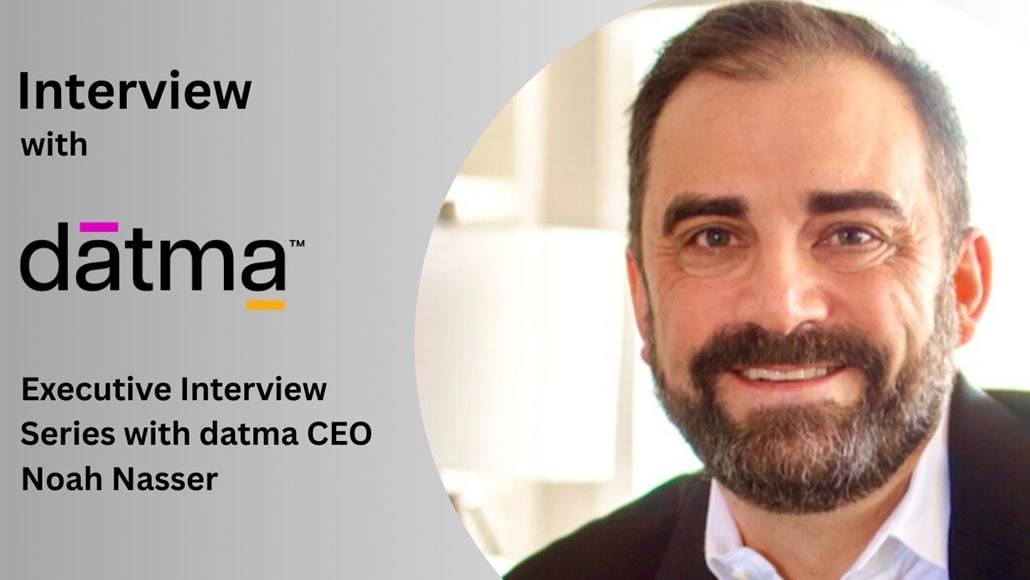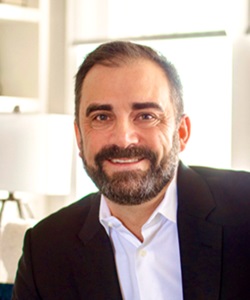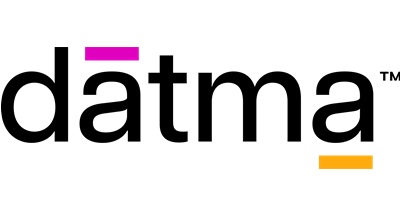datma is a leading provider of federated Real-World Data platforms and related tools for data analysis and visualization. datma’s mission is to empower healthcare organizations, including providers, clinicians, and researchers, to optimize their data assets, driving innovation and improving patient lives globally. Based in Oregon, the company, through its two-sided marketplace datma.FED is at the forefront of transforming how healthcare data is shared and applied by enabling secure collaboration between data custodians and data consumers. World Pharma Today interviewed datma CEO Noah Nasser to learn more about the company.
1. Let’s start with your background—can you share a bit about your journey in healthcare and what drew you to the world of data and innovation?
I’ve spent more than 30 years in the biotechnology and genomics sectors, leading companies focused on advancing human health through innovation. My career has spanned leadership roles at Serimmune, Human Longevity, Counsyl, AltheaDx, and Verinata Health. Across these roles, I saw recurring challenges with how healthcare data was used, or underused. What’s always motivated me is solving complex problems that stand in the way of progress. Data has always been central to those challenges, whether it’s about making personalized medicine a reality or closing the gap between discovery and delivery.
2. What inspired you to join datma, and what problem were you most eager to solve when you became CEO?
I joined datma because its federated model offers a credible answer to one of the biggest challenges in healthcare data: enabling access while preserving control. Labs and health systems generate some of the richest data in medicine, but much remains siloed operationally and jurisdictionally. These data are frequently too complex to access and use. At the same time, organizations are searching for more complete, representative, and reliable datasets to support discovery, evidence generation, and market access. datma bridges that gap by enabling secure, structured, and governed data collaboration at scale.
3. The healthcare industry is under increasing pressure to deliver more personalized, data-driven care. In your view, what’s holding the industry back from fully embracing precision medicine, and how does datma aim to change that?
The challenge in precision medicine is in the complexity of the data environment. Data is spread across formats, systems, and organizations. It’s often incomplete, hard to standardize, and governed by strict compliance rules. datma was designed to solve these challenges. Our federated platform allows it to query multimodal, longitudinal real-world data across institutions without transferring the data or exposing PHI. That model protects the data and unlocks it for high-value use cases like real-world evidence generation and market access strategy without sacrificing privacy or control.
4. You’ve described federated data as a game-changer for life sciences. Can you explain what federated real-world data is, and why it’s particularly well-suited to address pharma’s current challenges?
Federated RWE enables analysis where the data resides. This model maximizes control and privacy while enabling access to datasets often unavailable through traditional models, including molecular, pathology, and imaging data. It can also expand the data landscape, improving diversity and representation within these datasets by reducing the barriers to working with institutions that might not otherwise participate in data sharing efforts due to governance or resource constraints.
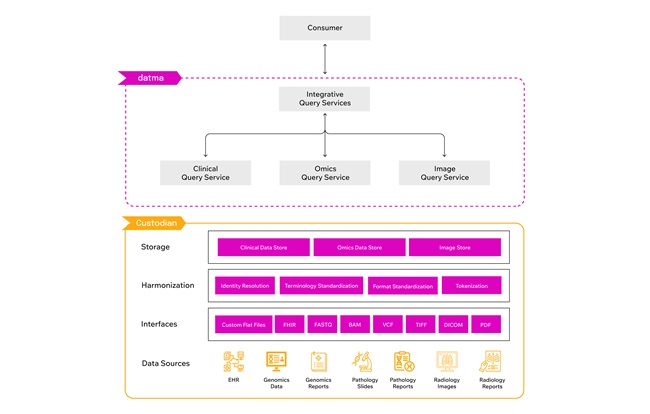
The federated approach is particularly well-suited to the needs of healthcare teams today. Whether the goal is to support evidence generation, understand diagnostic adoption, or assess treatment pathways, federated real-world data provides a way to do that with stronger privacy controls and less operational lift.
5. What role does data harmonization play in enabling better clinical and commercial decision-making across the drug development lifecycle?
Data harmonization is foundational. Without it, even the most expansive datasets are at best complex to use. Internal siloes, including legacy systems, file formats and system access can be compounded privacy concerns. Harmonization addresses these issues while ensuring that data privacy is paramount. In essence, harmonization is the bridge that allows data to be available for downstream computation. Our platform combines automation, AI tools, and our own framework to harmonize structured and unstructured data, from pathology reports to biomarker results, into a consistent, query-ready format. This makes it possible for pharma to ask complex questions across data sources and get reliable, actionable answers. Whether optimizing clinical trial design or identifying market access barriers, harmonized data enables confident, timely decision-making.
6. Many pharma companies struggle with incomplete data. How does datma.FED help overcome these issues while preserving data privacy and ownership?
Many of the insights pharma teams need, like molecular results, testing timelines, or pathology reports, aren’t available in many traditional datasets. datma.FED provides another path. Our platform reduces the operational burden that may limit broader participation by enabling queries to run directly within the data custodian’s environment. This approach brings in contributors who might not otherwise have the resources to expand the diversity and depth of the available data.
At the same time, our federated architecture ensures that data never leaves the source. Custodians define access parameters, and all activity is governed, logged, and privacy preserved. This decentralized architecture helps overcome traditional access barriers and creates a more complete picture of the patient journey.
7. Real-world evidence (RWE) is growing in post-approval settings, from label expansions and market access to clinical adoption. How does federated RWD support these efforts?
RWE becomes increasingly crucial after therapy is approved. Whether the goal is to support guideline inclusion, demonstrate value to payers, or understand treatment variation in the market, pharma teams need access to data that reflects how therapies perform in routine care.
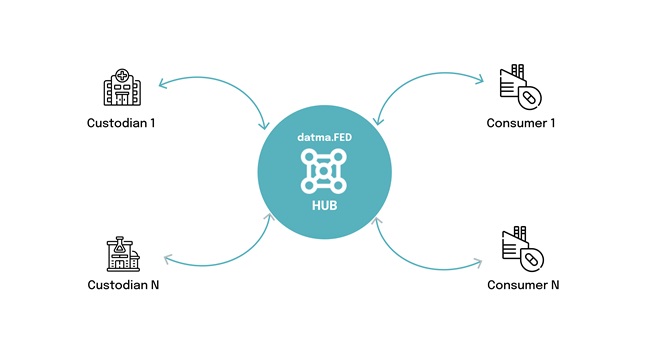
Federated RWD allows pharma to generate that kind of insight. By connecting to data sources where care is delivered, our platform supports structured queries across longitudinal datasets from real-world populations and care settings, not just idealized trial cohorts. That means capturing data from diverse patient groups, including those with comorbidities, those underrepresented in trials, and those in community settings. This leads to evidence that reflects how a therapy performs in actual practice. With the federated model, we are bringing in novel, underrepresented data sets from across institutions that are also more complete. Federation gives companies access to the depth and breadth of data needed for robust RWE, without compromising speed, quality, or compliance.
8. From a market access perspective, how are pharma teams using datma’s platform to identify biomarker prevalence, monitor molecular testing trends, or address gaps in treatment uptake?
Our platform is used to understand how diagnostic practices and care delivery influence therapy adoption. It supports analysis of time to diagnosis, test result turnaround, and whether biomarker findings are consistently acted upon. By identifying breakdowns, whether it’s a delay in testing or gaps in treatment sequencing, teams can prioritize market access strategies that address operational barriers, not just clinical evidence. These insights help inform more targeted, data-driven decisions across commercialization, reimbursement, and provider education.
9. What’s the opportunity for AI and advanced analytics when you layer it onto federated, harmonized datasets? Can you share an example of how this is driving innovation or efficiency for pharma?
AI models are only as strong as the data they’re trained on, and much of the data in healthcare has historically been fragmented, inconsistent, or incomplete. When AI is layered onto harmonized datasets across a federated network, it allows for more reliable, privacy-compliant modeling across real-world populations. This architecture makes it possible to identify patterns in how patients are diagnosed, treated, and monitored.
For example, one analysis of over 90,000 oncology patients helped reveal where targeted therapies were falling short in real-world settings. By identifying gaps between biomarker identification and treatment, we could surface where breakdowns in testing or prescribing were occurring.
As federated infrastructure scales and more diverse and longitudinal datasets become queryable, AI will play an even more significant role in shaping everything from trial design to commercialization to care optimization.
10. Looking ahead, how do you see the role of real-world data evolving over the next 3–5 years—and what’s next for datma in helping to lead that transformation?
RWD will continue to expand its role across the drug development lifecycle, from trial design and feasibility to payer negotiations and commercialization. We’re seeing less of a shift in expectations and more of an acceleration of what’s possible. With the proper infrastructure, it’s now feasible to generate real-world insights earlier, across more diverse and representative populations, and with less operational burden.
At datma, we focus on growing our federated network while providing the tools pharma needs to extract value from it. That includes deeper multimodal data, new analytics capabilities, and building on our existing ability to support evidence generation, patient journey mapping, and market access strategy, while deepening support for broader therapeutic areas.
We aim to make federated real-world data a standard part of how pharmaceutical teams approach insight generation and decision-making. We’re working toward a future where insights can be generated directly from the source, with full control and privacy protections in place, to inform better decisions and improve outcomes across healthcare.


















